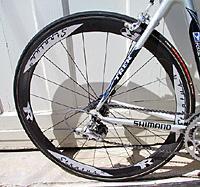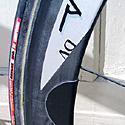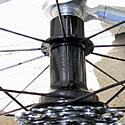
Recently on Cyclingnews.com |
Tech review - February 20, 2004

|
Reynolds Stratus DV carbon road wheels
By Chris Davidson
Reynolds composite wheels are the fruit of a partnership between Reynolds Composites and MacLean Quality Composites (MQC) in Salt Lake City, Utah. Reynolds Composites handles the sales and marketing side, but the man responsible for the making of the wheels is product manager Chris Bingham at MQC, and Bingham filled me in on the details of the wheels and how they came to be.
Bingham used to work for LEW Composites in Las Vegas. LEW's assets were bought by MQC and Bingham and LEW's manufacturing moved to Utah, where MQC - a division of MacLean-Fogg, a huge firm with expertise in power equipment and the automotive industry - handles the whole process from the manufacturing of the rims to the lacing and building of the wheels.
Bingham and MQC completely redesigned the LEW wheels to arrive at the two ranges now available, the deep-rim Stratus and shallow-section Cirro wheels.
Bingham explained that, in his days of racing on Mavic GEL280 rims himself, light used to mean fragile, but he hopes the Reynolds wheels reverse that thinking. All Reynolds wheels, even the ultralight Cirro-UL-KOM with its 220g rim, pass the UCI's strength tests for non-standard wheels, said Bingham, and he was keen to stress that the strength and light weight of the rims results from the material and manufacturing process. MacLean's experience with carbon fiber runs deep; the company also produces carbon fiber bicycle tubing for bike makers like Trek, Parlee, Seven and Calfee. Chris indicated that the design philosophy behind the new wheels was to go for ultra light, but not at the expense of durability and serviceability.

|
The Stratus DV on test here is the deep section wheel in the eight-model line-up of composite wheels from Reynolds and MCQ. The 46mm rims of our test samples were laced to White Industries LTA hubs with DT Revolution spokes on the front and non-drive rear and DT Competition double butted spokes in the rear. The front wheel uses 16 radial spokes while the rear's 20 spokes are arranged two-cross on the drive side and radial on the left.
The nipples -- alloy on the front and rear non-drive and brass on the drive side -- are hidden inside the rims and are inverted when threaded on the spoke ends so they can be turned with a special spoke key. Production wheels will be switching to Sapim spokes with similar dimensions soon.
As well as the Stratus DV wheels, Reynolds also offers the Stratus-DV-UL, with lighter rims, the Stratus Clincher and versions of the Stratus for cyclo-cross and track use. In addition there's the Cirro-SV and Cirro-SV-UL with shallower-section rims, and discs for special occasions.
The ride
An outing to the local crit proved to be a good testing venue for the wheels. On the ride out to the race course, I was first impressed by their stiffness. Some non-standard wheels just don't feel right, and it's usually because the whole wheel is too flexible as a result of insufficient spoke tension. Not so the Stratus DVs. The deep section rims provide a stiff base, and as I discovered later at the shop with a Wheelsmith tension meter, the spoke tensions are very high. Bingham confirmed my measurements: over 1000N in tension on the drive side rear. This makes for a very responsive wheel, but I would avoid gluing up 18mm tubulars on these wheels for obvious reasons.

|
The wheels seem to accelerate quickly and effortlessly out of corners and they feel solid when out of the saddle on an incline. The deeper section suffered a bit in side-winds, as do other similarly-shaped wheels, but the overall impression from the crit was of their light, rigid feel.
Braking was amazingly predictable for a carbon wheel, with no pulsing or lack of grip. In fact, after riding the wheels for five days, the additional pad wear on my stock Ultegra brake pads was more than worthwhile in exchange for the excellent stopping power.
These wheels were lighter than my standard racing wheels, and of the four offerings from Reynolds, they are the heaviest. It only gets lighter from here, I can't wait to try the Cirro-Ultralights.
What the pros really ride
In the bike racing world there are always questions as to what the sponsor actually makes and what the riders actually ride. While decals attempt to hide what is really going on, it amazes me to hear that some riders will actually pay to get some products. Case in point: these wheels. Bingham told me of the official endorsements that Reynolds wheels have with teams and individuals such as Todd Wells and Marc Gullickson (using the wheels for cyclocross). More interesting is the number of paying clients that have different wheel sponsors, yet buy and ride the Reynolds wheels. These include David Moncoutie of Cofidis and Genevieve Jeanson of Rona. Serious competition.
Conclusion
So on first spin these wheels are definitely worth a look, their performance being very impressive. The down side might include the tubular-only construction and the $1399 entry-level price tag, but these are race wheels, right? And ridiculously light and stiff ones at that, just what racing demands. The braking is a true advance over other carbon wheel products. These would make excellent wheels for road racing and crits, and I have no problems recommending them to all but the heaviest rider.
Weight: 515g front 735g rear (claimed)
Recommended retail price: US$1399
Pro: Light, rigid, excellent braking
Con: Price.
More information: Reynolds
Composites' website
Cyclingnews Rating: ![]()

